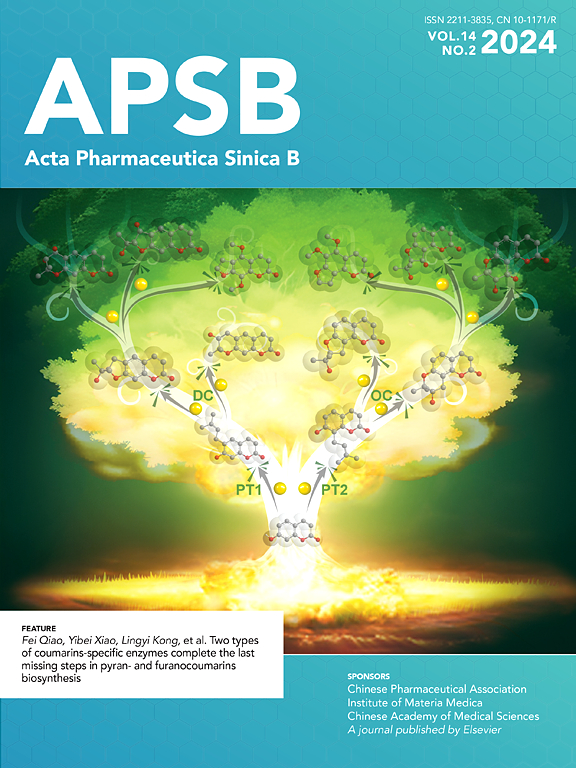肝细胞中普遍存在的microRNA-320下调可触发rfx1介导的FGF1抑制,从而加速MASH进展
IF 14.6
1区 医学
Q1 PHARMACOLOGY & PHARMACY
引用次数: 0
摘要
代谢功能障碍相关脂肪性肝炎(MASH)是一种严重类型的代谢功能障碍相关脂肪性肝病(MASLD),是世界范围内终末期肝病的主要病因,造成重大的健康和经济负担。microRNA-320 (miR-320)是一种普遍表达和进化保守的miRNA,据报道可调节脂质代谢;然而,miR-320是否以及如何影响MASH的发展仍不清楚。通过使用RNAscope进行miR-320原位杂交,我们观察到在MASH期间肝细胞中miR-320的显著下调,与疾病严重程度相关。最重要的是,肝细胞中miR-320的下调加剧了MASH的进展,这表明与对照组相比,肝细胞特异性miR-320缺陷小鼠更容易受到高脂肪、高果糖、高胆固醇饮食(HFHC)或缺乏胆碱、氨基酸定义的高脂肪饮食(CDAHFD)诱导的MASH的影响。相反,在不同类型的饮食诱导的MASH模型中,通过注射携带miR-320的腺相关病毒8 (AAV8),肝细胞中miR-320的恢复改善了MASH相关的脂肪变性和纤维化。机制研究表明,miR-320通过抑制调节因子X1 (RFX1)的表达特异性调节肝细胞中成纤维细胞生长因子1 (FGF1)的产生。值得注意的是,肝细胞中Rfx1的下调通过增强fgf1介导的AMPK激活来减轻MASH。我们的研究结果强调了肝脏miR-320通过抑制rfx1介导的FGF1抑制在MASH治疗中的治疗潜力。本文章由计算机程序翻译,如有差异,请以英文原文为准。

Downregulation of ubiquitous microRNA-320 in hepatocytes triggers RFX1-mediated FGF1 suppression to accelerate MASH progression
Metabolic dysfunction-associated steatohepatitis (MASH), a severe type of metabolic dysfunction-associated steatotic liver disease (MASLD), is a leading etiology of end-stage liver disease worldwide, posing significant health and economic burdens. microRNA-320 (miR-320), a ubiquitously expressed and evolutionarily conserved miRNA, has been reported to regulate lipid metabolism; however, whether and how miR-320 affects MASH development remains unclear. By performing miR-320 in situ hybridization with RNAscope, we observed a notable downregulation of miR-320 in hepatocytes during MASH, correlating with disease severity. Most importantly, miR-320 downregulation in hepatocytes exacerbated MASH progression as demonstrated that hepatocyte-specific miR-320 deficient mice were more susceptible to high-fat, high-fructose, high-cholesterol diet (HFHC) or choline-deficient, amino acid-defined, high-fat diet (CDAHFD)-induced MASH compared with control littermates. Conversely, restoration of miR-320 in hepatocytes ameliorated MASH-related steatosis and fibrosis by injection of adeno-associated virus 8 (AAV8) carrying miR-320 in different types of diet-induced MASH models. Mechanistic studies revealed that miR-320 specifically regulated fibroblast growth factor 1 (FGF1) production in hepatocytes by inhibiting regulator factor X1 (RFX1) expression. Notably, knockdown of Rfx1 in hepatocytes mitigated MASH by enhancing FGF1-mediated AMPK activation. Our findings underscore the therapeutic potential of hepatic miR-320 supplementation in MASH treatment by inhibiting RFX1-mediated FGF1 suppression.
求助全文
通过发布文献求助,成功后即可免费获取论文全文。
去求助
来源期刊

Acta Pharmaceutica Sinica. B
Pharmacology, Toxicology and Pharmaceutics-General Pharmacology, Toxicology and Pharmaceutics
CiteScore
22.40
自引率
5.50%
发文量
1051
审稿时长
19 weeks
期刊介绍:
The Journal of the Institute of Materia Medica, Chinese Academy of Medical Sciences, and the Chinese Pharmaceutical Association oversees the peer review process for Acta Pharmaceutica Sinica. B (APSB).
Published monthly in English, APSB is dedicated to disseminating significant original research articles, rapid communications, and high-quality reviews that highlight recent advances across various pharmaceutical sciences domains. These encompass pharmacology, pharmaceutics, medicinal chemistry, natural products, pharmacognosy, pharmaceutical analysis, and pharmacokinetics.
A part of the Acta Pharmaceutica Sinica series, established in 1953 and indexed in prominent databases like Chemical Abstracts, Index Medicus, SciFinder Scholar, Biological Abstracts, International Pharmaceutical Abstracts, Cambridge Scientific Abstracts, and Current Bibliography on Science and Technology, APSB is sponsored by the Institute of Materia Medica, Chinese Academy of Medical Sciences, and the Chinese Pharmaceutical Association. Its production and hosting are facilitated by Elsevier B.V. This collaborative effort ensures APSB's commitment to delivering valuable contributions to the pharmaceutical sciences community.
 求助内容:
求助内容: 应助结果提醒方式:
应助结果提醒方式:


